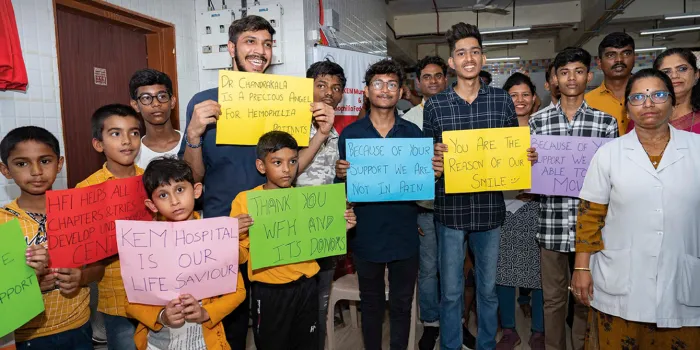World Federation of Hemophilia (WFH) USA plays a critical role in ensuring that people with inherited bleeding disorders receive the care and treatment they need — regardless of their type of bleeding disorder, gender, or where they live.
By supporting the mission of the WFH within the United States, the organization engages American residents, foundations, and corporations to make a lasting impact through humanitarian aid; advocacy; training; education; research and data collection; and scholarships and grants.
WFH’s mission is being accomplished through several endeavors:
The WFH Humanitarian Aid Program seeks to improve the lives of people with inherited bleeding disorders, giving them a quality of life that previous generations would not have thought possible. The program’s main support activities are delivering donated factor and non-factor replacement therapy, conducting training events, and providing logistics support.
Since 1996, the program has helped more than 6,500 patients go on prophylactic treatment; distributed more than 2.3 billion IUs of factor and 12.9 million milligrams of non-factor replacement therapy; and helped treat more than 30,000 people.
The Women and Girls with Bleeding Disorders Initiative and the Global Policy and Access Summit provide the community with essential platforms to amplify voices and drive policy changes. These initiatives, along with several others, have reached over 130 countries.
The WFH Cornerstone Initiative provides support, expertise, and training to countries where care for people with inherited bleeding disorders is severely limited or not available at all. A Cornerstone Initiative project is implemented for a period of up to four years, and then countries become eligible for the full range of programs and activities offered by the WFH.
In 2024, the WFH implemented Cornerstone Initiative projects in Madagascar, Rwanda, Tajikistan, Tanzania, and Togo. (Sierra Leone and Gabon will be joining in 2025.) Thanks to the initiative, these countries have been able to achieve significant progress in expanding diagnosis, outreach, and education.
In Tanzania, there’s been a 2 1/2-fold increase in the diagnosed population since 2019. Training for health care professionals and improved governance structures in Rwanda have resulted in the identification of several new people with hemophilia. In Madagascar, the national member organization secured government approval to integrate hemophilia training into regional health care curricula, and in Tajikistan, the establishment of a hemostasis laboratory at the national reference hospital will provide free diagnostic testing to the community. In Togo, the WFH national member organization (NMO) organized training for board members, people with bleeding disorders, and health care professionals on outreach and identification strategies.

